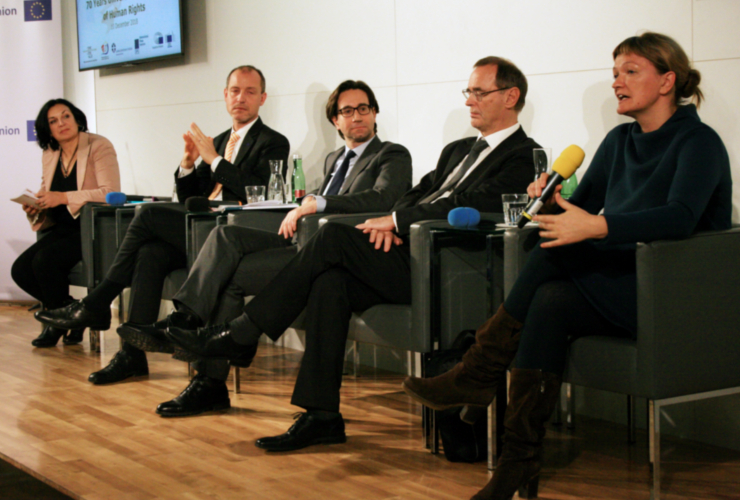Who are the Russian spies captured in the Baltic countries over the few past years, how are they recruited and in which other ways is Russia pursuing its agenda in Europe?
These were some of the questions that a five-country team of investigative journalists led by the Baltic Center for Investigative Journalism (Re:Baltica) sought to answer to in a series of articles published this autumn on the nature of Russian meddling in the Baltics and the Central European Visegrád countries.
“With the Baltics’ being next to the Russian border, we are usually the testing ground for many methods”, Sanita Jemberga, executive director and editor at Re:Baltica, told the International Press Institute (IPI) during a recent interview in Vienna. “From our experience, it starts with us, goes to the Visegrád region and then to western Europe.”
Jemberga said this pattern had already been used in money laundering and fake NGO schemes. In this case, she explained, “the idea was to show the trend in which Russia either engages regular people in spying and to show which fields it is interested in”.
For the investigation, the Riga, Latvia-based Re:Baltica teamed up with journalists at Postimees in Estonia, 15min.lt in Lithuania, Respekt in the Czech Republic and Direkt36 in Hungary. The project was supported with a €26,000 grant from IJ4EU, a fund backed by the European Commission via the European Centre for Press and Media Freedom (ECPMF) and managed by IPI. IJ4EU, which launched in 2018, aims to support cross-border investigative journalism in Europe.
From spies to diplomatic horse-trading
Since the Russian annexation of Crimea in 2014, the Baltic countries have stepped up their efforts to catch Russian spies operating in their territory. At least 23 people have been apprehended in Estonia, Latvia and Lithuania since 2015 for knowingly collaborating with Russian intelligence agencies. This year, Jemberga’s team managed, in what is believed to be a first, to interview some of the convicted spies, which include a Latvian construction worker recruited while living in Russia, a Russian IT student in Estonia and a captain in the Lithuanian Air Force.
Espionage cases are usually handled behind closed doors, Jemberga noted, which complicated access to witnesses and documents related to the case.
“The success of the stories was dependent on whether people wanted to talk or not”, Jemberga said. “But they did. Some of them wanted to talk because they were angry about being left behind, some generally guilty in their own heart and some of them hoped they could clarify their own doubt.”
The Hunter Becomes the Prey: Confessions of a Russian Spy: https://t.co/Gza60ZSqBv
Read the latest piece in our #ISpy series! ?
Latviski: https://t.co/om6G4IA72c
По-русски: https://t.co/ORiU9iSsWd pic.twitter.com/8VFhVhwKXb— Re:Baltica (@rebaltica) December 6, 2018
The cross-border investigation also looked at other forms of Russian operations in Europe. In recent years, the Czech Ministry of Foreign Affairs has been targeted in cyberattacks carried out by Russian intelligence agencies. Respekt and Re:Baltica journalists found that the attack on the ministry was larger and lasted longer than previously reported.
Another event that attracted the team’s attention was Hungary’s relationship with Russia in light of the Skripal affair. Hungary appeared to have stood in unison with other EU countries in expelling a Russian diplomat following the poisoning. However, an investigation by Direkt36 and Re:Baltica showed that, in reality, Hungary and Russia made special arrangements to avoid risking the relationship between the two countries.
“If the Baltics are a testing ground of the methods, Hungary is a testing ground on how much you can split EU countries without it becoming a public issue”, Jemberga said.
Is Europe prepared?
Jemberga said the articles offered increased knowledge of the methods of Russian intelligences services in Europe and would lead European governments to ask themselves whether they are ready to safeguard both European principles and state secrets from possible attacks.
“The main takeaway was that Russia engages in any level it can, big and small, on the borders, in the army and in diplomacy”, Jemberga said. “The rest (Ed: the response by targeted states) is up to politicians.”
Jemberga stressed that the stories have relevance beyond the Baltic states.
“It is not utterly new to us, but I think in some countries in western Europe it would be an eye-opener when you start to see the same thing”, she said of the types of activities her team’s stories identified.
Please, RT our recent story from our “Spies series”. Russia and Hungary seemed to clash over the Skripal poisoning. In the background, it was a different story. Written by our talented colleague from Hungary @panyiszabolcs https://t.co/yWqcxfS8E5
— Inga Springe (@IngaSpringe) October 29, 2018
To reach a wider audience, the team has published each of the stories in three languages: in the local language of the country where the story was set as well as in English and in Russian.
“We thought it was essential to issue the stories in Russian as well because you cannot talk about Russia if you do not write in Russian”, Jemberga stressed. “If you want people to hear you, you have to do it in their language.”
Thus far, Latvia and Russia have refrained from reacting to the investigations publicly. Spy cases are nothing new in Latvia, which has convicted three people for spying in Russia since the end of the Soviet Union.
“We didn’t expect any reaction from Russia because the strategy of the official Russia is not to react. We always sent the questions to the GRU (Russian intelligence service) and to Russian embassies, but there was never an answer”, Jemberga said. She added that her team did not experience threats from Russia or its supporters, although the journalists took necessary safety precautions.
EU needs to back investigative journalism
Altogether over 20 journalists worked on the investigative stories over nearly five months, demonstrating the time-consuming and expensive nature of investigative journalism. Jemberga stressed the importance of funding from European institutions to be able to carry out such investigative projects, particularly in countries with a weaker media market and where journalists cannot rely on sufficient financial support from public institutions.
These problems are palpable for investigative journalists in the Baltic countries, Jemberga said. Re:Baltica operates on funds granted by international donors, ranging from independent trusts to various embassies, as well as individual donors.
Jemberga highlighted several misconceptions regarding the state of independent media the EU. The first, she said, is that all EU member states enjoy a high level of media freedom and pluralism with a strong media market. Another false belief is that markets would fix all the problems of the media industry.
These misconceptions, she said, have been shattered as Europe has witnessed the rise of regimes hostile to press freedom in Hungary and Poland. At the same time, media companies have shown less interest in investing in investigative journalism.
“The EU has to recognize that investigative journalism will not survive unless it is funded internationally”, Jemberga said.



